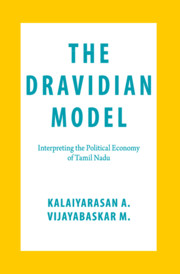Book contents
- Frontmatter
- Dedication
- Contents
- List of Tables
- List of Figures
- List of Abbreviations
- Acknowledgements
- 1 The Dravidian Model: An Introduction
- 2 Conceptualising Power in Caste Society
- 3 Democratising Education
- 4 Democratising Care
- 5 Broadening Growth and Democratising Capital
- 6 Transforming Rural Relations
- 7 Popular Interventions and Urban Labour
- 8 Fissures, Limits and Possible Futures
- Bibliography
- Index
3 - Democratising Education
Published online by Cambridge University Press: 08 July 2021
- Frontmatter
- Dedication
- Contents
- List of Tables
- List of Figures
- List of Abbreviations
- Acknowledgements
- 1 The Dravidian Model: An Introduction
- 2 Conceptualising Power in Caste Society
- 3 Democratising Education
- 4 Democratising Care
- 5 Broadening Growth and Democratising Capital
- 6 Transforming Rural Relations
- 7 Popular Interventions and Urban Labour
- 8 Fissures, Limits and Possible Futures
- Bibliography
- Index
Summary
In September 2018, a Dalit family in Kuzhumur, a village in the backward district of Ariyalur, built a library housing 2,500 books and computers with online access (TNM 2018). Making a case for the initiative, members of the family said that this will help rural children access educational materials that are normally available only to children from urban elite households. Supported by various political parties, the library was to commemorate the memory of their daughter Anitha, who had committed suicide a year earlier when she failed to get admission into a medical college despite scoring 1,176 marks out of 1,200 in her school final exams. These marks were the sole basis for admission into medical colleges in the state before introduction of the National Eligibility Cum Entrance Test (NEET), a national-level eligibility-cum-entrance exam for admissions, overturned the basis for eligibility, and rendered such high marks irrelevant. Anitha's death fuelled large-scale protests all over the state and constituted an important moral axis for subsequent agitations around this issue. Since then, a couple of more teens committed suicide following their failure to clear NEET (Ranjan 2019). This raises important questions about aspirations and access to education in the state: What made such aspirations the norm for many lower-caste youth? When NEET failed to evoke similar resistance in other parts of the country, why did it become a major concern in Tamil Nadu?
Such aspiration, we argue, is rooted in a Dravidian common-sense that made access to modern education a key pathway to mobility and social justice. This chapter explains the forging of this common-sense and such aspirations among lower-caste groups, and the policy response in this domain. We draw upon Arjun Appadurai's (2004) conceptualisation of the ‘capacity to aspire’ to map the constitution of aspirations among subaltern groups in the state. Appadurai defines the ‘capacity to aspire’ as the cultural capacity of the poor to find the resources required to contest and alter or improve the course of their destiny. For him, such a capacity comprises of two domains of freedom. First it requires removal of material deprivation rooted in backwardness in education and poverty. The second involves securing dignity and respect that are denied by low status aspirations vis a vis the elites.
- Type
- Chapter
- Information
- The Dravidian ModelInterpreting the Political Economy of Tamil Nadu, pp. 52 - 81Publisher: Cambridge University PressPrint publication year: 2021



